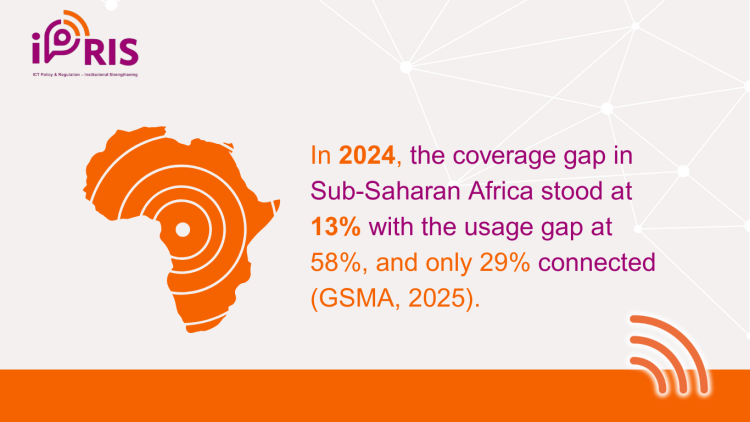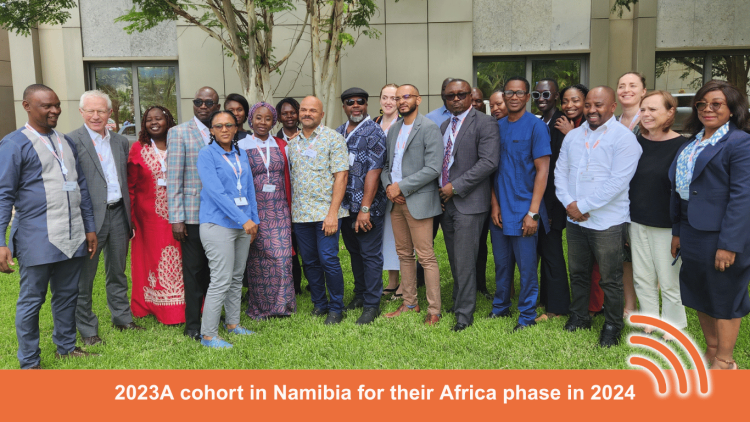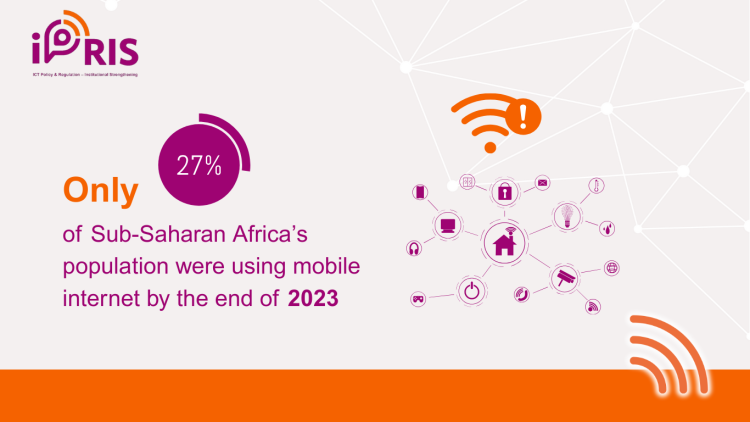From 6–24 September 2025, Luxembourg will host the second Francophone iPRIS round in Europe, bringing together telecom regulators and experts from across Francophone Africa for two and a half weeks of peer-to-peer learning, collaboration, and strategic action planning. The round builds on the success of the 2024B Francophone cohort, which was the first French cohort from Sub-Saharan Africa (SSA) to participate in iPRIS. This new cohort will continue iPRIS’s commitment to strengthening institutional leadership in ICT regulation and advancing affordable, inclusive, and sustainable digital transformation across Africa.
Among the confirmed regulators are the National Regulatory Authorities (NRAs): ARCEP Benin, ARCT Burundi, ART Cameroon, ARPTC Congo Kinshasa, ORTEL Equatorial Guinea, ARCEP Gabon, ARPT Guinea, and, on the Regional Regulatory Organisations (RROs) side, WATRA, EACO, and ATRAC. They will also be joined by representatives from ARCEP France, BNETZA, IBPT, and Deloitte. This special mixture of institutions provides an environment that, from the learning perspective, allows a balance between local realities and international perspectives, an African-led space in partnership with global partners.
Africa has a lot of economic prospects in almost every field. The continent's young population is a huge opportunity in this digital age, which is why Africa needs to make digitally enabled socio-economic development a top priority. However, Africa remains the continent that is the least connected worldwide; only 38 percent of Africans were online as of 2024, as compared to 68 percent globally, according to the International Telecommunication Union (ITU, 2025).

These figures highlight the need for a shift in regulation and infrastructure growth in SSA. Access to affordable, reliable connectivity underpins economic competitiveness, social inclusion, and resilience. With such sectors being improved, the digital space in the continent has the potential to improve the lives of SSA’s population.
This round will focus on the ability of regulators to respond effectively to:
- Affordability challenges that stand as barriers to digital inclusion in Sub-Saharan Africa. In 2024, the median price of an entry-level mobile broadband plan was the highest compared to other regions and is well above the UN Broadband Commission's affordability target of two per cent. Fixed broadband is far less affordable (ITU, 2025).
- Gender gaps to digital inclusion, wherein in 2024, 43 per cent of men were online in Africa against 31 per cent of women (ITU, 2025).
- Emerging regulatory frontiers in areas such as 5G, satellite-to-device services, and cross-border spectrum coordination.
A key component of the iPRIS project is the planning and implementation of “Change Initiatives”, strategic projects designed to address specific challenges within each regulator's jurisdiction. Change Initiatives in earlier rounds have included:
- Revising spectrum policies to reduce broadband costs.
- Expanding consumer protection frameworks.
- Designing regulatory roadmaps for universal service funds.
The 2025 Francophone round will continue this approach, ensuring that knowledge exchange translates into measurable change at home. Following the Luxembourg workshop, a regional support team from the RROs will assist the regulators in implementing their change initiatives. The whole 2025C cohort will reconvene in one African country after 4 months to review progress and refine their projects. The effectiveness of the initiatives will be evaluated one year after the project’s commencement in 2026.
In addition to structured sessions, regulators will take part in field visits to operators, European regulatory institutions, and cultural landmarks. These experiences enrich the learning journey and provide space for informal collaboration.
iPRIS has engaged 24 national telecom regulators
It has been an exciting journey built on information sharing and capacity-building. The first iPRIS cohort 2023A, comprising regulators from Nigeria, Kenya, Namibia, Eswatini, South Sudan, Zambia, and Sierra Leone, completed their iPRIS cycle in December 2024. They initially started their round in November 2023.

We also proudly welcomed the second iPRIS cohort (2024A) into the growing iPRIS alumni community. Their final wrap-up session in June marked the culmination of impactful Change Initiatives and strong regional collaboration. The 2024A cohort comprised South Africa’s ICASA, Lesotho’s LCA, Uganda’s UCC, Mauritius’s ICTA, The Gambia’s PURA, and Tanzania’s TCRA. The first-ever Francophone cohort comprised of NRAs representing the Central African Republic, Chad, Comoros, Congo Brazzaville, Mauritania, Senegal, and Togo.
So far, iPRIS has engaged 24 national telecom regulators in Sub-Saharan countries, including Kenya, Nigeria, Ghana, Namibia, South Africa, Tanzania, Uganda, Zambia, Eswatini, Central African Republic, Chad, Comoros, Congo-Brazaville, Mauritania, Senegal, Togo, Lesotho, Mauritius, Rwanda, The Gambia, South Sudan, Liberia, Zimbabwe, and Sierra Leone. Regional Regulatory Organisations (RROs)—CRASA, WATRA | ARTAO, EACO, ARTAC—play a central role in shaping the iPRIS ecosystem. From leading peer-learning sessions to offering guidance on cross-border spectrum harmonisation and NGSO frameworks, their contributions continue to drive the regional integration agenda.
Success stories from iPRIS
Several iPRIS and predecessor programme cohorts have already translated Change Initiatives into regulatory milestones that are reshaping Africa’s digital landscape:
1. Tanzania: Direct-to-mobile satellite guidelines
The Tanzania Communications Regulatory Authority (TCRA) has approved a pioneering set of Guidelines for the Provision of Direct-to-Mobile (D2D) Satellite Communication Services, making Tanzania one of the first African countries to establish a clear framework for satellite-enabled mobile connectivity.
This Change Initiative was designed and developed during the iPRIS 2024A cohort round by TCRA’s representatives – Eng. Aude Nishael Kileo, Ms. Gudila Proches Marick, and Mr. Christopher John Assenga.
With only 27% of Sub-Saharan Africa’s population using mobile internet by the end of 2023 (GSMA 2024), the Tanzanian framework positions the country at the forefront of regulatory innovation, ensuring satellite-to-device services can be safely and sustainably deployed to connect underserved and remote communities.
Download the official TCRA Guidelines

2. Mauritius: Strengthening cybersecurity frameworks
The Information and Communication Technologies Authority (ICTA) of Mauritius has launched comprehensive Cybersecurity Guidelines for all licensed telecom operators. These self-assessment tools help operators evaluate vulnerabilities, strengthen resilience, and prepare for the forthcoming 5G-driven digital ecosystem.
This Change Initiative emerged from ICTA’s participation in the iPRIS 2024A cohort, with the Mauritian delegation comprising Mr. Trilok Dabeesing, Ms. Priya Chutoorgoon, and Mr. Pralash Nahullah. Read More
3. Uganda: Hosting the ITU Global Symposium for Regulators (GSR 2024)
Uganda’s Communications Commission (UCC) successfully hosted the Global Symposium for Regulators (GSR) 2024 in Kampala, demonstrating the country’s leadership in advancing inclusive ICT regulation. Read More
4. Mozambique: Redefining roaming
In Mozambique, a Change Initiative developed during the 2018B International Training Programme (ITP), the direct predecessor to iPRIS, has resulted in a landmark National Roaming Regulation.
The regulation was officially gazetted in 2025. It allows mobile subscribers in rural and underserved areas to access services from multiple operators, reducing coverage gaps and enhancing financial inclusion through mobile money services. Read More
A continental ripple effect
These examples illustrate how iPRIS Change Initiatives are not only driving national reforms, but also informing regional harmonisation and shaping Africa’s contribution to global digital policy debates.
Aligning with Africa’s digital vision
The African Union Digital Transformation Strategy (2020–2030) underscores that Africa’s youthful population structure is an enormous opportunity in the digital era. With the youth making up nearly 60% of Africa’s population, digital transformation must be at the centre of socio-economic development. Digitalisation is not just about connectivity. It is a driver of job creation, innovation, poverty reduction, and inclusive growth.
For regulators, the call to action is clear:
- Prioritise affordability and inclusivity in broadband policies.
- Integrate gender-responsive frameworks into digital regulation.
- Strengthen regional cooperation through platforms like iPRIS.
- Build effective public–private partnerships to expand infrastructure and services.
The second Francophone iPRIS round in Luxembourg is more than a peer-to-peer learning session. It is a strategic investment in Africa’s digital future. By equipping telecom regulators with knowledge, networks, and practical tools, iPRIS advances the vision of a continent where connectivity is affordable, inclusive, and transformative. The future of Africa is digital. Ensuring that it is also equitable and sustainable depends on the leadership strengthened through initiatives such as iPRIS.
iPRIS is coordinated and implemented by SPIDER in strategic and technical partnership with the Swedish Post and Telecom Authority (PTS) and the Luxembourg Regulatory Institute (ILR).
iPRIS is funded by the European Union, Sweden, and Luxembourg as part of the Team Europe Initiative “D4D for Digital Economy and Society in Sub-Saharan Africa” (Code: 001).





